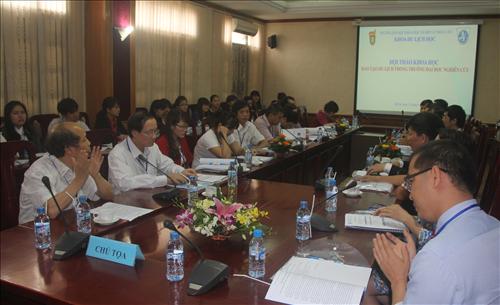
The presentations mentioned the opportunities and challenges of the tourism industry in general and tourism human resource training in particular, and discussed solutions to improve the quality of tourism training in accordance with social needs and development trends in the world.
Tourism is identified as a basic and spearhead economic sector of the country. The goal of Vietnam's tourism industry is to develop in a professional direction with high-quality, diverse, branded tourism products, imbued with national cultural identity, and able to compete with the region and the world. By 2030, Vietnam strives to become a country with a developed tourism industry.
Experts say that job opportunities in the tourism and hospitality sector are increasing due to the high growth rate of domestic and international tourists. This opens up great opportunities for domestic tourism human resource training facilities.

According to the "Vietnam Tourism Development Strategy to 2020, Vision to 2030" announced by the Ministry of Culture, Sports and Tourism in 2012, by 2015, 2.2 million workers will be needed in the tourism sector, and by 2020, over 3 million workers will be needed. From 2015 to 2020, the proportion of workers with specialized training in tourism must be increased from 60% to 80%-100%. From 2015, there must be at least 90,000 tourism workers with university degrees or higher. Meanwhile, according to the "Vietnam Tourism Human Resource Development Plan for the 2011-2020 period", currently only about 3.2% of the total workforce in the industry have university and post-graduate degrees, which is less than 20,000 people, equal to 22% of the requirements. On average, every year, more than 8,000 university bachelors and over 500 masters need to be trained. Thus, with this demand, universities in Vietnam cannot meet it.
In addition, legal documents on education development strategies, tourism development strategies, etc. of the State and Ministries and sectors at all levels have created an important basis for training institutions to plan development strategies and appropriate training scales.
Tourism education is also facing a number of challenges:
One is the emergence and development of many tourism university training institutions nationwide in the style of “a hundred flowers blooming” with different training contents and forms. The country currently has 62 universities, providing over 1,000 university graduates in tourism-related majors every year.
Second, Tourism Studies does not have an official training code. The code is a standard framework for organizing, implementing and managing training content. According to the development of society, the code system also needs to be expanded to support universities and to be in line with the general trend of the world. Currently, putting the training program and tour guide into the code of Vietnam Studies not only makes the quality of the output products not meet the requirements of Vietnam Studies but also does not meet the requirements of the Tourism industry. Similarly, the code of "Tourism and Travel Services Management" is also unreasonable.
Third, competition in the tourism industry has been placing more stringent requirements on human resource training in the industry. Practical training in tourism is very elaborate, time-consuming and laborious. Schools lack teachers who are good at their profession and have practical experience. New tourism trends, increased tourism abroad and investment in tourism abroad… force training institutions to constantly adjust their training programs and content to suit the realities of the industry.
Currently, the Faculty of Tourism Studies, University of Social Sciences and Humanities is a prestigious and branded training institution for Tourism Studies in the country. The Faculty was the first institution to open a Master's program in Tourism in 2003, and the first faculty in the University of Social Sciences and Humanities to successfully open a dual degree program in 2009. In addition, the faculty's permanent and part-time staff have high professional qualifications, rich practical experience and qualified foreign language skills.

In the development trend of the University of Social Sciences and Humanities towards a research university, the Faculty of Tourism Studies has determined its direction to become a research-oriented training institution. Contributing to this development direction of the Faculty, the delegates proposed a number of solutions:
Firstly, it is necessary to raise awareness of research universities among the staff, students and trainees of the Faculty. Research universities must be university environments that focus on research activities and postgraduate training, a place to gather and train professional researchers as well as have research results that contribute to the development of human knowledge. Research universities must be universities that move towards becoming elite universities.
Second, the Faculty needs to have a specific and appropriate development strategy for each stage. Based on social needs and its own strengths, the Faculty needs to focus on developing postgraduate training in both breadth and depth. Specifically, quickly adjust and update the research master's training program, open more applied master's training programs, and complete the doctoral training project in tourism.
Third, the Faculty needs to promote domestic and international training cooperation, especially cooperation with training institutions with advanced training programs to help the Faculty improve its professional capacity and organizational management capacity. The Faculty also needs to expand international cooperation training programs to promote professional exchange, transfer of training and research technology; promote cooperation with tourism enterprises to strengthen the relationship between the University and practice.
In addition, the Faculty needs to immediately implement benchmarking activities, which means forming a process of continuous evaluation of teaching, research, learning and applying good lessons from advanced training institutions.
Author:Thanh Ha
Newer news
Older news